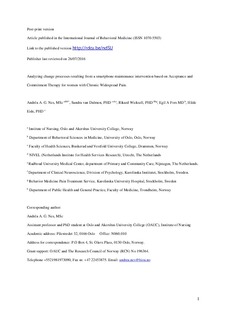Analyzing change processes resulting from a smartphone maintenance intervention based on acceptance and commitment therapy for women with chronic widespread pain
Journal article, Peer reviewed
Accepted version
Permanent lenke
http://hdl.handle.net/11250/2465836Utgivelsesdato
2017Metadata
Vis full innførselSamlinger
Originalversjon
International Journal of Behavioral Medicine. 2017, 24 (2), 215-229. 10.1007/s12529-016-9590-7Sammendrag
Purpose This study investigated change processes resulting from a randomized controlled trial smartphone-delivered maintenance intervention with daily electronic diaries and personalized written feedback based on acceptance and commitment therapy (ACT) following a rehabilitation program for patients with chronic widespread pain. Method This study included 48 women who during a 5-week period completed electronic diaries three times daily, totaling 3372 entries. In response to the completed diaries, they received daily feedback from a therapist for 4 weeks (excluding weekends), totaling 799 feedback messages. To analyze the change processes, we explored the associations between feedback and daily ratings of participants’ physical activities, positive emotions, pain fear and avoidance, pain acceptance, and self-management. Commitment to physical activities and the participants’ evaluation of feedback were also analyzed. Multilevel models were used in the statistical analyses. Results Participants’ average pain fear and avoidance decreased over the intervention period (mean −0.019, P = 0.05). Self-management, pain acceptance, and positive feelings increased (mean −0.030, P < 0.01; mean −0.015, P < 0.01; and mean −0.011, P = 0.01, respectively). Participants’ performance of physical activities decreased slightly over time, but the level of commitment was high and they evaluated the feedback as supportive for staying sufficiently active. No correlation between diary contents and feedback messages was found, even though most of the participants evaluated the feedback as supportive. Conclusion No support was found for an association between diary content and feedback based on ACT. However, diary measures were consistent with the ACT model and may have influenced positively the change processes.
